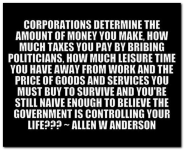- Joined
- Dec 1, 2017
- Messages
- 24,476
- Reaction score
- 7,808
- Gender
- Undisclosed
- Political Leaning
- Undisclosed
Neoliberalism, or neo-liberalism,[1] is a term used to describe the 20th-century resurgence of 19th-century ideas associated with free-marketcapitalism.[2]: 7 [3]
A significant factor in the rise of conservative and libertarianorganizations, political parties, and think tanks, and predominately advocated by them,[4][5] it is generally associated with policies of economic liberalization, including privatization, deregulation, globalization, free trade, austerity and reductions in government spending in order to increase the role of the private sector in the economy and society;[6][14] however, the defining features of neoliberalism in both thought and practice have been the subject of substantial scholarly debate.[15][16]
As an economic philosophy, neoliberalism emerged among European liberalscholars in the 1930s as they attempted to revive and renew central ideas from classical liberalism as they saw these ideas diminish in popularity, overtaken by a desire to control markets, following the Great Depression and manifested in policies designed to counter the volatility of free markets, and mitigate their negative social consequences.[17]: 14–15
One impetus for the formulation of policies to mitigate free-market volatility was a desire to avoid repeating the economic failures of the early 1930s, failures sometimes attributed principally to the economic policy of classical liberalism. In policymaking, neoliberalism often refers to what was part of a paradigm shiftthat followed the alleged failure of the Keynesian consensus in economics to address the stagflation of the 1970s.[18][19]
A significant factor in the rise of conservative and libertarianorganizations, political parties, and think tanks, and predominately advocated by them,[4][5] it is generally associated with policies of economic liberalization, including privatization, deregulation, globalization, free trade, austerity and reductions in government spending in order to increase the role of the private sector in the economy and society;[6][14] however, the defining features of neoliberalism in both thought and practice have been the subject of substantial scholarly debate.[15][16]
As an economic philosophy, neoliberalism emerged among European liberalscholars in the 1930s as they attempted to revive and renew central ideas from classical liberalism as they saw these ideas diminish in popularity, overtaken by a desire to control markets, following the Great Depression and manifested in policies designed to counter the volatility of free markets, and mitigate their negative social consequences.[17]: 14–15
One impetus for the formulation of policies to mitigate free-market volatility was a desire to avoid repeating the economic failures of the early 1930s, failures sometimes attributed principally to the economic policy of classical liberalism. In policymaking, neoliberalism often refers to what was part of a paradigm shiftthat followed the alleged failure of the Keynesian consensus in economics to address the stagflation of the 1970s.[18][19]

